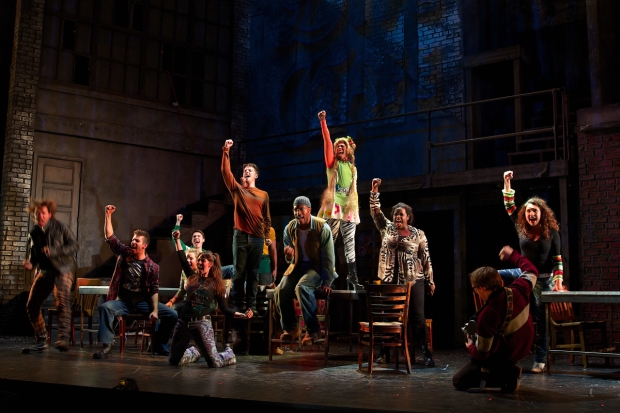Rent
La Mirada Theatre for the Performing Arts celebrates the upcoming 20th anniversary of Jonathan Larson’s classic with a new production.

(© Jason Niedle)
When Rent arrived at the Nederlander Theatre in 1996, a block from New York City's famed 42nd Street, it was revolutionary. Never before had a musical brought punks, drag queens, gays, lesbians, and AIDS patients to the mainstream. Coming directly after the British Invasion of the '80s and the Disneyfication of Times Square, the rock musical was sharp, funny, and heartbreaking. It touched theatergoers once oblivious to life in Manhattan's rundown Alphabet City and brought in a new generation that once ignored musical theater and now stood outside for hours in the cold to win lottery seats. Rent reinvented the musical for the new millennium.
Using Puccini's La Bohème as a framework, Rent follows a group of artists fighting the system and trying to survive their drug addictions and failing bodies. Emotionally fragile couple Roger (Devin Archer) and Mimi (Cassie Simone) attempt to build a relationship between AZT breaks. Egocentric performance artist Maureen (Emily Goglia) and her lawyer girlfriend, Joanne (Amber Mercomes), are constantly in a battle of wills. Drag queen Angel (Lawrence Cummings) and Tom Collins (John Devereaux) fall madly in love as Angel's AIDS prognosis worsens. Meanwhile, Mark (Mark Whitten) steps behind the video camera and documents his friends' lives.
Composer, lyricist, and book writer Jonathan Larson's musical wasn't just timely for the '90s, it was inventive. Filled with power ballads, commentary about Generation X, and several poignant love stories, many of the show's songs — including "Take Me or Leave Me," "Seasons of Love," and the rousing Act 1 finale "La Vie Bohème" — have become iconic and generation-defining.
In this production, several good lead performances and an excellent chorus are commendable. The company sounds crisp in the Act 2 opening and in "I'll Cover You: Reprise," but in numbers like "Christmas Bells," where each character sings a different tune, lyrics are either indecipherable or the microphones are too low on some members so that the excitement of hearing different melodies colliding is lost.
Goglia is dynamic as Maureen. She energizes the show, especially with her interpretation of "Over the Moon." Goglia has the vinegar that her character requires to be both aggravating and lovable. Cummings is also endearing as the ebullient Angel. Simone has a strong voice and gives Mimi the required edge. As the capitalist scum Benny, Cooper Howell sings the role well and is appropriately slithery. Mark is a challenging role, since the character is inert by nature. This inaction can become a problem for actors and, unfortunately, that's what happens to Whitten. He has a fine voice but his Mark is bland and uninvolving. Archer is unable to connect with his character, causing Roger to appear uninvolved throughout the evening. His voice also seems caught in the back of his throat, which makes Roger's anthems sound languid.
Director Richard Israel has not utilized the performances enough to convey the tragedy that's essential to make Rent soar. Part of what made the musical a watershed event is that many of the young people who flocked to the Nederlander recognized their story onstage. AIDS was still an epidemic, and many in the audience knew relatives and friends who suffered or had died from the disease. That immediacy is what spoke to the zeitgeist, and that urgency is what's sorely lacking in these performances. Here they seem more blasé than emboldened.
Technical problems hamper the production further. While Mark videotapes his friends throughout the play, a screen displays what the camera captures. However, because the video is out of sync, it's disorienting to see the mouths on the screen delayed by five seconds from the actors performing onstage. Sound issues continue in the scene where thugs beat Tom Collins, but the sound effects don't align with the action onstage.
Stephen Gifford's set is massive and impressive, with several levels and ornate details, such as hanging flyers and a Christmas tree made out of a Jesus Saves cross, but it also overwhelms the small cast. When Mimi breaks out in "Out Tonight," the banister railing seemingly caused more of a cumbersome obstacle course than a dance flow. Steven Young's lighting is outstanding, shadowing some performers, while showering a beacon of light on others. John Glaudini's orchestra sounds a bit tinny, and more Muzak than a vibrant band.
Even 20 years later, Rent is still a special show. It's both a masterful tragedy and a celebration of life. This production, however, feels more pedestrian than Jonathan Larson's original vision.









